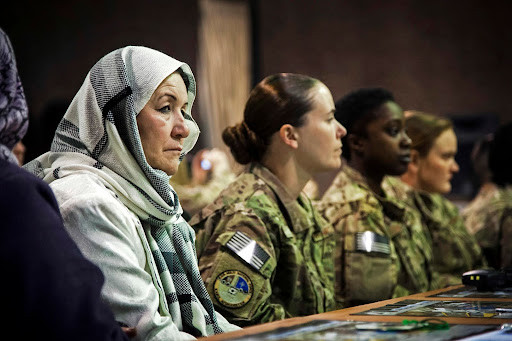When It comes to Women, the United States Leads the Way

The United States stands as the only country in the world to pass a law on Women, Peace and Security (WPS). In October 2017, the United States took the groundbreaking step when President Donald Trump signed into law the bipartisan Women, Peace, and Security Act.
This legislation marked the first comprehensive WPS law globally, making the United States a pioneer in formally recognizing women's critical contributions to conflict prevention, management, and resolution. The Act builds on the growing policy framework developed over the past two decades to improve women's participation in security processes, evolving from the landmark Security Council Resolution 1325 approved at the United Nations in 2000.
The Women, Peace, and Security Act of 2017 requires the United States to develop a comprehensive strategy to increase and strengthen women's participation in peace negotiations and conflict prevention. This bipartisan achievement represents years of collaborative work by members of Congress, administration officials, and advocates seeking better solutions to end wars, combat terrorism, and improve human rights worldwide. The law ensures Congressional oversight in the U.S. Government's efforts to integrate women's perspectives across its diplomatic, development, and defense-related work in conflict-affected environments.
The Evidence for Women's Participation in Peacebuilding
Research demonstrates that the inclusion of women in peace processes significantly enhances stability and reduces conflict. When women participate in peace negotiations, the resulting agreement becomes 64 percent less likely to fail and 35 percent more likely to last at least fifteen years.
Studies consistently show that higher levels of equality between men and women correlate with a lower propensity for conflict, both between and within nations. Data from countries worldwide further confirms that including women in peacekeeping units, police forces, and security sectors improves accountability and decreases abuses against civilians.
Women serve as essential peacebuilders in communities globally, countering extremism, preventing conflicts, and driving economic growth. Their contributions significantly reduce the need for international interventions, thereby enhancing global stability and prosperity. After conflicts, the promotion of women-led businesses boosts economic recovery for everyone, creating jobs and fostering widespread prosperity. Improvements in women's access to technology, financial credit, and resources contribute to the productivity not just of women but of society as a whole.
Strategic Implementation Across Government Agencies
Following the passage of the WPS Act, the Trump Administration released the first U.S. Strategy on Women, Peace, and Security in June 2019, making the United States the first nation with both a comprehensive law and a whole-of-government strategy on WPS.
This strategy recognized the diverse roles women play as agents of change in preventing and resolving conflict, countering terrorism and violent extremism, and building post-conflict peace and stability. It identified key strategic objectives: preparing women to participate in peace efforts, improving protection for women and girls, and institutionalizing WPS efforts within government structures.
As mandated by the Act, the U.S. Departments of State, Defense, and Homeland Security, along with the U.S. Agency for International Development, submitted implementation plans outlining how they would operationalize the WPS Act within their respective missions.
The Act requires these agencies to provide training for diplomats, development professionals, and security personnel to support the inclusion of female negotiators, mediators, and peacebuilders around the world. To promote accountability, the law also imposes reporting requirements on relevant federal agencies, ensuring continued focus on advancing women's participation in security processes.
The Future of Women, Peace, and Security Initiatives
The Biden Administration had continued these efforts, including through Executive Order 14020 in March 2021, which established the White House Gender Policy Council and directed the creation of the first-ever U.S. National Strategy on Gender Equity and Equality. The administration also established the Women Leading Effective and Accountable Democracy in the Digital Age initiative (Women LEAD), focused on advancing women's political participation globally and addressing barriers to women's leadership, both online and offline.
Women constitute 50 percent of the global population and play a key role in helping countries become more secure and peaceful. In the United States, this translates to a continuing commitment to making women a central part of U.S. foreign policy.
The Women, Peace, and Security Congressional Caucus continues to promote awareness and congressional oversight to ensure the WPS mandate is carried out effectively. As most of the legislative mandates of the Women, Peace, and Security Act expired in 2024, prioritizing the Act's renewal remains essential to institutionalizing WPS efforts and strengthening global peace and stability.
© Copyright IBTimes 2025. All rights reserved.




















